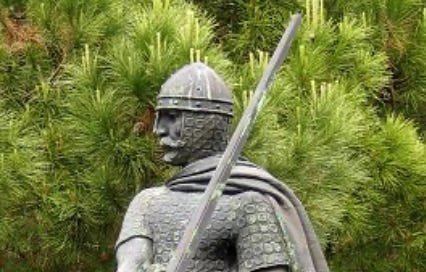I have a rather eclectic assortment of podcasts on my iPhone. To keep track of politics in the US I have Rachel, Nicole, and NPR Politics. To maintain my financial literacy I listen to Planet Money. Because we all need smut and gossip, I listen to Even the Rich. And because I slept through history class, I enjoy This Week in History1. So today, let me take you to my version of this week in Portuguese history.
The Year is 1147
The year is 1147. There is an uneasy stalemate between the Muslims and the Christians. Christian morale is low. Perhaps a second crusade will cheer things up! So with the help of French knights, the King decides to attack Santarém (an area northwest of Lisbon on the Tagus River). They send a letter to the Muslim governor, demanding he surrenders. The governor ignores the letter believing there are too few soldiers to conquer the city. But three knights scale a ladder over the city’s wall. They overtake the few guards on duty and are able to open the main gate. The other knights raced in and quickly take the city…killing the unarmed (Portuguese) citizens, most of whom were Christians.
Of course, prior to the attack, the knights had vowed to renounce personal gain…fighting only for Christ. But in the heat of battle, they carried off the citizen’s valuables. And immediately thereafter, King Afonso I granted the knights ownership of all of the city’s churches. To the victor go the spoils….
Next Stop Lisbon
The success in Santerém sparked recruiting events in France, Germany, and England. 3000 were recruited and 164 ships set sail for Portugal. Immediately upon arriving in Portugal the recruits make demands, effectively going on strike until an agreement can be reached on how the spoils of war will be divided.
At this time, Lisbon is a thriving city. In fact, with an estimated 150,000 residents (please note: women and children were not counted) Lisbon is larger than Paris or London. It was a trading capital and was rich in natural resources:
It is second to none, rich in products of the soil, whether you are looking for the fruit of trees or of vines. It abounds in everything, both costly articles of luxury and the necessary articles of consumption. It also contains gold and silver and is never wanting in iron mines. The olive flourishes. There is nothing unproductive or sterile or which refused to return a harvest. They do not boil their salt but dig it. Figs are abundant that we can hardly eat a fraction of them. The region is celebrated for many forms of hunting. The air is healthful. In its pastures the mares breed with a wonderful fucundity. — Diary of Knights Chaplain, Library of Corpus Christi College, Cambridge
Afonso concedes and a formal charter is written. In it, he agrees that the knights “shall have it [the city] and hold it until it has been searched and despoiled. After it has been ransacked to their full satisfaction, they shall hand it over to me.” He also awarded the area around the city to the knights and their heirs according to rank and would decree they be exempt from dues and taxes.
The Siege of Lisbon lasted 15 weeks.2 Finally, five men left the city hoping to negotiate a surrender. Perhaps it should come as no surprise that the various armies wanted to relitigate how the spoils would be divided before negotiating. But ultimately the gates of the city were opened. The knights streamed in murdering, raping, and looting. The Christians, holding crucifixes, were not spared…the Bishop of Lisbon was murdered.
These actions were recorded by the Knights Chaplain:
Oh, what rejoicing there was on the part of all! Oh, what special pride on the part of all! Oh, what a flow of tears, of joy and piety, when to the praise and honor of God and of the Most Holy Virgin Mary, the ensign of the salvation-bearing Cross was placed upon the highest tower…
To the victor go the spoils.
This is not the complete list! I listen to a lot of Wondery crime stories, History is Us, and when I need history to elevate my mood I listen again and again to Jon Meacham’s Hope Through History.
To learn more about this and other aspects of Portuguese history read The First Global Village, How Portugal Changed the World.






Thank you, Nancy.
Thanks for the bite-sized history lesson. And also the the podcast recommendations. I needed to freshen up my rotation.